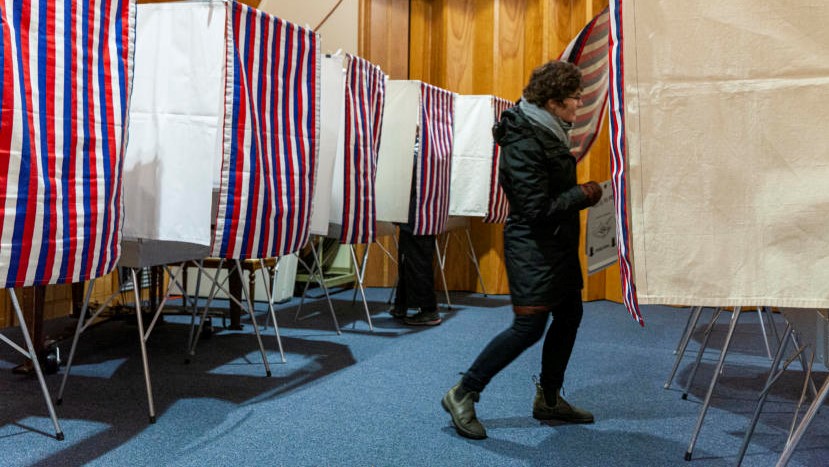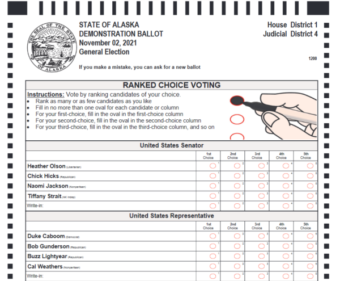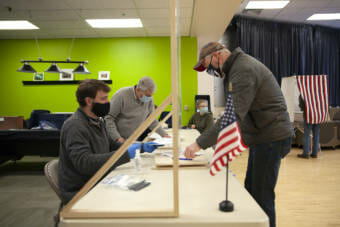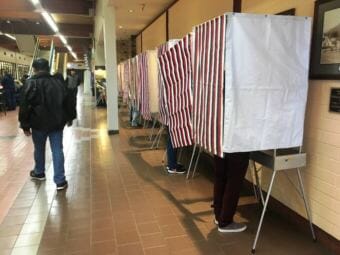
The new election system Alaska voters adopted in 2020 will weaken political parties and bring chaos, an attorney challenging the legality of Ballot Measure 2 told the state Supreme Court Tuesday.
But lawyers defending the measure say it gives voters what they want.
Unless the justices strike it down, Alaskans will engage in ranked choice voting in November. That feature has grabbed a lot of headlines but it took up very little of the oral arguments Tuesday. The lawyers did spend a lot of time discussing another other big transformation brought by Ballot Measure 2: The non-partisan primary.
If it’s upheld, all candidates will appear on the same primary ballot, regardless of party. Voters will select one candidate per race, and the top four will advance to the general election.
A candidate can have any party affiliation they like next to their name, or none.
That is unfair to parties, said former Republican Party attorney Ken Jacobus, who argued the case and is one of the plaintiffs in the legal challenge of the ballot measure.
“Parties and voters have to accept self-designated candidates that they may not want or that they may even disagree with but are now not allowed to identify the candidates that they actually support or endorse,” he said. “Chaos will be created by that system.”
Jacobus also claimed that Alaskans only adopted Ballot Measure 2 because it also requires more transparency in political contributions, and getting rid of “dark money” is broadly popular. When the justices asked him for evidence of that, he cited another vote 18 years prior, the Alaska Automatic Runoff Voting Initiative, which failed by a wide margin.
Jacobus represents, in addition to himself, the Alaskan Independence Party, Scott Kohlhaas and Robert Bird, two men who have run for office as third- and fourth-party candidates. They’re appealing a Superior Court decision from July that upheld the new election system.
Assistant Attorney General Laura Fox defended the new system on Tuesday, on behalf of the Division of Elections. She said parties will no longer be able to hold a state-sponsored primary to select their candidates. But Fox said they are still free to hold their own selection process and endorse their favorites. In fact, she argued, they are freer, because they don’t have government regulation dictating their methods.
Political parties “can convey their support for whatever candidates they want, in whatever manner they want,” she said. “They can campaign for and against candidates, as they please.”
The lawyers and the justices spent very little time discussing ranked choice voting, due to take place in the general election this November, assuming the Supreme Court doesn’t overturn it.
Ranked choice voting has been likened to an instant runoff. Voters will have the opportunity to rank the candidates, one through four. If no candidate wins a majority in the first round, the fourth place finisher is eliminated and those ballots are reassigned according to the voters’ second choices. Another round may also occur.
The state of Maine has adopted ranked choice voting. So have major cities, including New York.
Scott Kendall, who helped write Ballot Measure 2 and defended it to the Supreme Court, said it’s not very complex.
“Voters simply must ask themselves, ‘if my preferred candidate is eliminated, which of the remaining three candidates (if any) do I want to support?’” he wrote in the brief for the ballot measure sponsors, Alaskans for Better Elections. “Alaskans can count to four in the general election voting booth.”
Chief Justice Daniel Winfree didn’t say when the court would rule, but he acknowledged that the state needs to know soon because it’s got an election to run.



